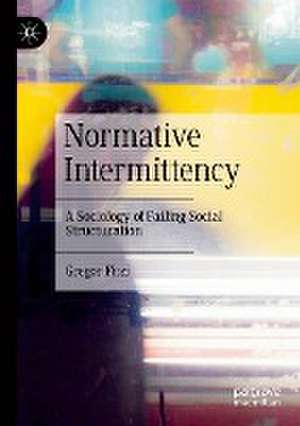Normative Intermittency: A Sociology of Failing Social Structuration
Autor Gregor Fitzien Limba Engleză Paperback – 17 iun 2023
| Toate formatele și edițiile | Preț | Express |
|---|---|---|
| Paperback (1) | 726.85 lei 43-57 zile | |
| Springer International Publishing – 17 iun 2023 | 726.85 lei 43-57 zile | |
| Hardback (1) | 732.07 lei 43-57 zile | |
| Springer International Publishing – 16 iun 2022 | 732.07 lei 43-57 zile |
Preț: 726.85 lei
Preț vechi: 886.41 lei
-18% Nou
Puncte Express: 1090
Preț estimativ în valută:
139.08€ • 145.60$ • 115.08£
139.08€ • 145.60$ • 115.08£
Carte tipărită la comandă
Livrare economică 07-21 aprilie
Preluare comenzi: 021 569.72.76
Specificații
ISBN-13: 9783031061769
ISBN-10: 3031061764
Ilustrații: VII, 342 p.
Dimensiuni: 148 x 210 mm
Greutate: 0.42 kg
Ediția:1st ed. 2022
Editura: Springer International Publishing
Colecția Palgrave Macmillan
Locul publicării:Cham, Switzerland
ISBN-10: 3031061764
Ilustrații: VII, 342 p.
Dimensiuni: 148 x 210 mm
Greutate: 0.42 kg
Ediția:1st ed. 2022
Editura: Springer International Publishing
Colecția Palgrave Macmillan
Locul publicării:Cham, Switzerland
Cuprins
1. Introduction.- 2. The manifold crisis of complex societies.- 3. The malaise of normative societal structuration.- 4. Economic liberalism and social fragmentation.- 5. Evidences in structure theory.- 6. Troubles in action theory.- 7. Shifting legitimacy: the theoretical issue of social validity.- 8. Consequences in structure theory.- 9. Conclusions in sociological diagnosis.- 10. Political Outcomes.
Notă biografică
Gregor Fitzi is Associated Researcher at the Centre Georg Simmel, École des Hautes Études en Sciences Sociales, France.
Textul de pe ultima copertă
This book addresses the manifold crisis of current societies and understands it as a failure of normative social structuration. As an exemplar for this development, it analyses the decline of welfare state models and the corresponding societal compromise. Yet, it evaluates them as a symptom of a wider malaise of normative orders in complex societies. The question thus arises as to how social science can study the ongoing societal transformation. The book frames the phenomenon as ‘normative intermittency’ to capture its fluid alternation of social structuration and destructuration and develops its analysis in three steps: first, it draws a theoretically reflected symptomatic of its occurrences; it then establishes the sociological diagnosis necessary to understand its unfolding and finally evaluates its political outcomes. Methodologically, the book advocates a complete overhaul of the analytical frames of sociology to gauge the intermittent rhythm of the ongoing societal transformation. Thus, it develops an innovative reading of classical sociological theory beyond a number of unreflected axiomatic assumptions of the current sociological mainstream. Thanks to the assessment of the political outcomes of failing social structuration the book turns to a discussion of the development of possible emancipation paths in the form of ‘transformative social action’; reflexively, this accounts for the results of the sociological diagnosis of the crisis of normative social orders. The main analyses within the book scrutinise a number of empirical phenomena that establish normative intermittency in current societies and refer to the major debates that are taking place on the related topics in the state of art of sociological and political theory.
Gregor Fitzi is Associated Researcher at the Centre Georg Simmel, École des Hautes Études en Sciences Sociales, France.
Caracteristici
Develops a path to critical sociology that overcomes the bottlenecks of current critical theory Proposes a symptomatic as well as a sociological diagnostic of ‘normative intermittency’ Offers a compelling sociological diagnosis of the crisis of normative social orders
